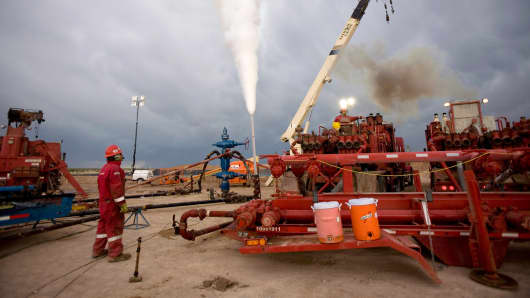Brent crude oil edged up in choppy trading on Monday, seesawing with the U.S. dollar, as investors weighed a statement from Saudi Arabia disputing claims OPEC's largest producer has altered its output policy.
Traders also eyed the start-up of a key pipeline expansion in the United States, which should help reduce the glut of crude oil that has depressed benchmark U.S. prices in the Midwest relative to international rivals.
Oil analysts said the dollar index drew pressure and crude received an early lift after Charles Evans, the Chicago Federal Reserve president, said in a speech that the Fed "will provide the monetary accommodation necessary" to help boost the economy.
Front-month Brent crude rose more than $1 to settle at $111.88 a barrel, having seesawed either side of the 100-day moving average at $111.02. U.S. oil rose by 58 cents to settle at $94.14.
Brent's premium to U.S. crude expanded to nearly $18, having briefly narrowed to less than $17 a barrel on Friday for the first time since September, and narrowing to a fresh four-month low of $16.69 earlier on Monday before reversing.
The spread has narrowed following last week's start-up of the expanded Seaway pipeline, expected to ease the glut of crude in the U.S. Midwest and especially at the Cushing, Oklahoma delivery point for the U.S. futures contract.
Saudi Statement
After last week's news that Saudi Arabia's crude output fell in December, a senior Saudi oil ministry adviser told the state news agency that the kingdom cut oil production because of lower seasonal demand.
Tim Evans, an analyst at Citi Futures Perspectives in New York, said the Saudi statement had given traders "assurances that Saudi Arabian production cuts were not a bid to push prices higher." Saudi Arabia announced a price target of $100 last January.
Wall Street was lower after shares of Apple were hit by demand concerns, while investors faced a busy week for earnings in what is expected to be a lacklustre quarter. Concerns about raising the U.S. debt ceiling also applied pressure on oil and stock markets, brokers and analysts said.
U.S. President Barack Obama said on Monday that he would be willing to take over authority for raising the U.S. borrowing limit if Congress does not want to increase the debt ceiling.
Obama was asked at a news conference about differences he is having with congressional Republicans over raising the $16.4 trillion debt ceiling that the country is expected to hit as soon as the middle of next month. He warned it risked tipping the U.S. economy into recession.
"This is about paying your bills," he said. "We've got to stop lurching from crisis to crisis to crisis."
Republican congressional leaders on Monday repeated their demand that increases in U.S. borrowing authority must be accompanied by spending cuts.


